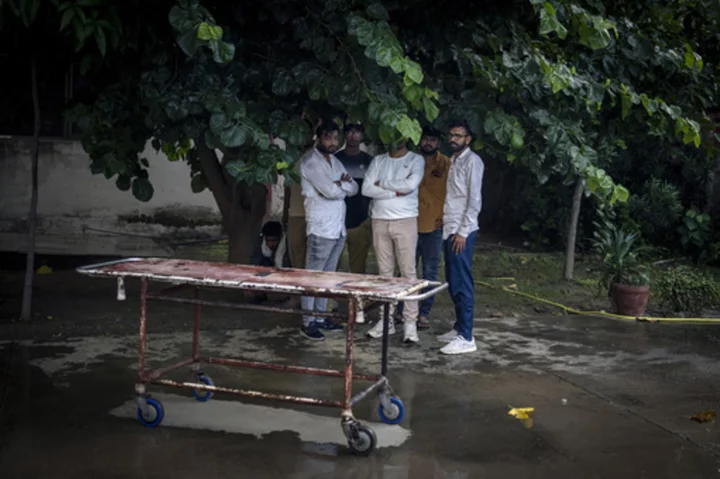Advocates and Nebraska lawmakers are defending a reporter after Gov. Jim Pillen said her story about environmental concerns at his farms wasn't worth discussing because the reporter was from “communist China.”
The Asian American Journalists Association, the chair of the Congressional Asian Pacific American Caucus and some state lawmakers have condemned Pillen and demanded that he apologize to Flatwater Free Press reporter Yanqi Xu.
The comments, which received a flood of publicity this week when the online media organization's executive director wrote a scathing column, is just the latest in the nation in which an elected official has personally attacked a reporter. The scrutiny the story is getting also comes amid a wave of pandemic-driven anti-Asian racism and new laws restricting foreign ownership of farmland.
Pillen's staff has not responded to emails or phone messages seeking comment, although he likely will be asked about it Friday during a news conference to discuss the hiring of people with intellectual disabilities. News about his remark has spread widely published through the U.S. and even in Chinese news outlets.
It all started last month when the Free Press published Xu's story revealing that 16 of Pillen’s farms recorded nitrate levels at least five times higher than what is considered safe to drink. His children now operate the business called Phillen Family Farms, which the Free Press reported consisted largely of hog barns.
A company official told the Free Press in a statement that the company worked closely with state regulators and was dedicated to ensuring "groundwater is protected."
“No. 1, I didn’t read it. And I won’t,” Pillen, a Republican, responded days later when asked about it on a radio show. “No. 2, all you got to do is look at the author. The author is from communist China. What more do you need to know?”
Xu recalled in an interview Thursday that she was “shocked and saddened” when an editor pulled her aside to tell her what the governor said. But before writing more, the paper wanted to check about any potential repercussions for Xu.
She grew up in China but has lived in the U.S. since 2017. After graduating from the University of Missouri, she went to work two years ago at the Flatwater Free Press, an independent, nonprofit news organization based in Omaha.
The column that ultimately was published had her blessing.
“In difficult times. I just felt that we shouldn’t stay silent,” she said. “And then, of course, I was thinking about the community behind me and, you know, who also might have felt really hurt because of the governor’s comment.”
Tweets flooded in, offering her support as the column began to circulate, and she said she was “deeply, deeply moved.”
Among those tweeting was Omaha Sen. Megan Hunt, a left-leaning lawmaker who fled the Democratic Party mid-session to register as an independent, who called that the governor’s remark “Racist and disgusting.” Her rebuke was retweeted by Omaha Sen. Machaela Cavanaugh, who led a filibuster this year in an attempt to derail a proposed ban on gender-affirming care for minors.
Asian Americans have increasingly been the target of racially motivated harassment and assaults in recent years, particularly since the coronavirus pandemic began, with many worrying that anti-Asian rhetoric linked to fraught relations between the U.S. and China could lead to more violence.
With the pandemic raging, CNN reporter Natasha Chen went on the air to describe how a Florida beachgoer told her to get out of the country and that she was responsible because of her ethnicity.
U.S. reporters also have been singled out. In 2020, Weijia Jiang of CBS News asked President Donald Trump a question about the pandemic. Trump said that “maybe that’s a question you should ask China. Don’t ask me. Ask China that question.”
Jiang — who was born in Xiamen, China, and emigrated with her family to West Virginia when she was 2 — wondered why the president directed that remark to her. Trump said he would say it to “anyone who asks a nasty question.”
Meanwhile, governors have been raising concerns about foreign land ownership. Prior to this year, 14 states had laws prohibiting or restricting foreign ownership and investments in private farmland. But that ballooned to 24 states this year as lawmakers in nearly three-quarters of states considered legislation on the topic, according to The National Agriculture Law Center at the University of Arkansas.
Naomi Tacuyan Underwood, executive director of the Asian American Journalists Association, described what happened to Xu in an interview as another example of how “people always resort to the perpetual foreigner trope and question our loyalties."
She said journalists aren't the only ones subjected to this, recalling that earlier this year a GOP lawmaker questioned the loyalty of U.S. Rep. Judy Chu based on her Chinese heritage.
Chu, a Democrat from California who chairs the Congressional Asian Pacific American Caucus, was among those who joined the clamor for an apology from Pillen, condemning his remarks as a “baseless xenophobic attack.”









